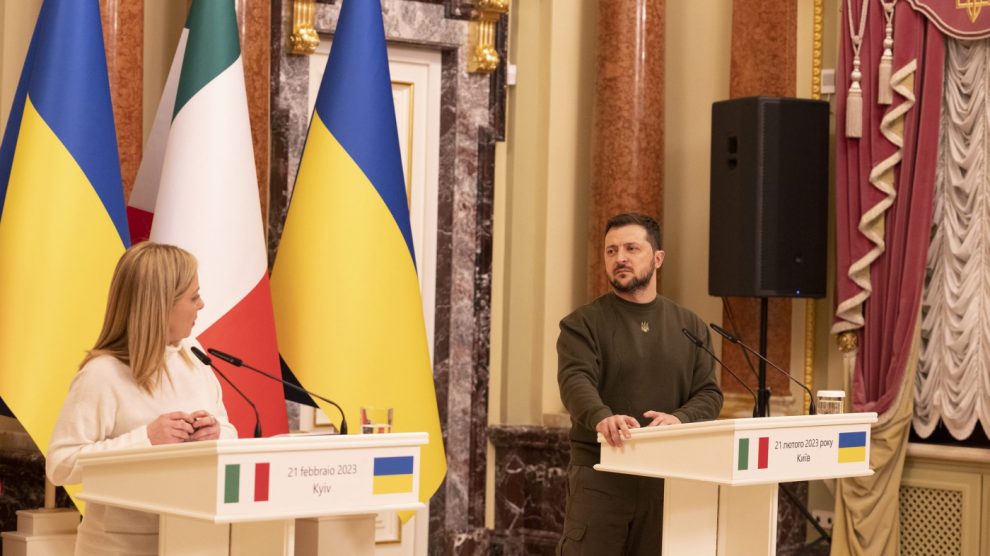When PM Giorgia Meloni visited Kyiv, she reasserted Rome’s complete alignment with the Euro-Atlantic framework and her government’s effective continuity with her predecessor, Mario Draghi. “Italy does not intend to waver and will not do so,” she said during a joint presser with Ukrainian President Volodymyr Zelensky.
- She promised that Italy “will give every possible assistance so that the conditions for negotiations can be created; but until then, it will give every kind of military, financial and civil support”, stressing that “whoever is supporting Ukraine, even militarily, is working for peace.”
- “It is impossible to turn away. It would also be very stupid to do so. Not only because there are attacked people, but because Ukrainian interests coincide with those of Europe” and the free world at large, she added.
Assuring military support. At the latest Ukraine Defence Contact Group in Ramstein, Defence Minister Guido Crosetto reasserted Italy’s alignment with NATO by pushing allies to speed up deliveries. Italy is working to provide air defence gear, including the advanced SAMP/T system, which is crucial to prevent Russia from establishing air supremacy.
- Meanwhile, Allies are debating whether to send fighter jets in accordance with the country’s request. Though PM Meloni said they are “off the table” for the time being, she also specified it’s a decision Rome must make alongside international partners.
A strengthening position? Chances are Rome is consolidating its standing among European capitals through these multi-level commitments. As Marta Dassù told us, PM Meloni’s government can carve out a significant geopolitical space for itself by linking “the core of the EU’s founding countries, the eastern members that have become more relevant, and the UK,” which is seeking a new relationship with the EU.
Look (West and) South. This also strengthens Rome from the US’ perspective – a weight that Italy, in turn, can simultaneously throw behind its own projections towards the South, where partner countries seek reassurance on the effects of the Ukrainian war.
- Rome is aware that the Southern shore of the Mediterranean Sea, especially African nations – which were hit particularly hard by the flare-up in grain prices caused by Russia’s earlier disruption of trade routes – is wary of the current international instability.
And then, East. Italy is also looking at the most complex issue of the moment: Russia-China relations. When Wang Yi, head of the Chinese Communist Party’s diplomacy, was in Rome, Italian Foreign Minister Antonio Tajani told him that China had to take responsibility and work concretely to stop Moscow.
Rome’s scepticism. Italy, like most of Europe, is watching the attempt at peace with Chinese characteristics (especially in light of the “rock-solid relations” that Mr Wang spoke of while in Russia) with a healthy measure of disenchantment.
- Many in the West suspect that Beijing’s peace plan is more of a diplomatic ploy to paint itself as a trusted and credible international player.
- Also, China stands to gain from this war – both in terms of Russia’s increasing dependence on it and the weakening of the Western front.
- Which, as Philippe Le Corre (Senior Fellow at the Essex Business School’s Institute for Negotiation Research and Education) told our sister website, is ultimately why Europeans are “increasingly pessimistic about the possibility of a positive role for China in this war.”
With that awareness in mind, it’s clear that Chinese assistance to Russia could be a game changer. Although not necessarily for the better, because if Beijing ends up supplying Moscow with weapons – as the US fear – it risks further international destabilisation. Including in Europe.




